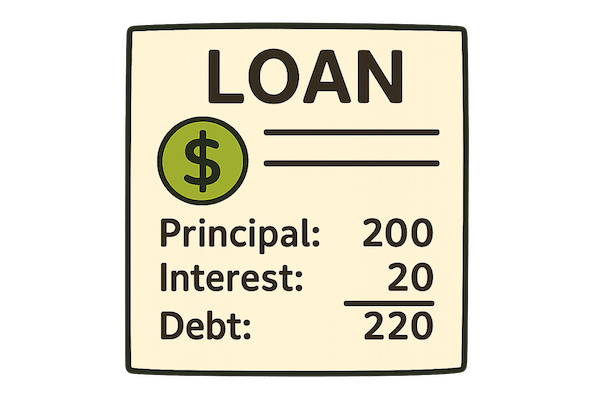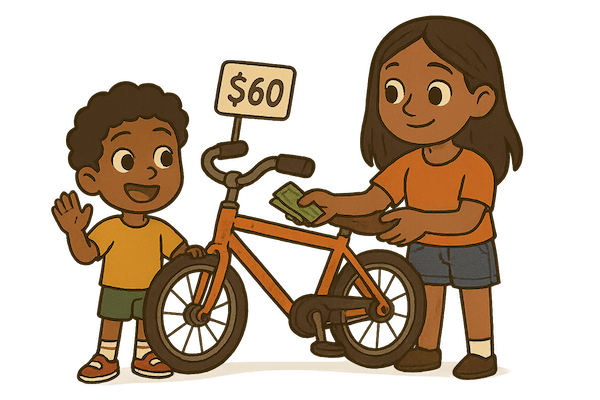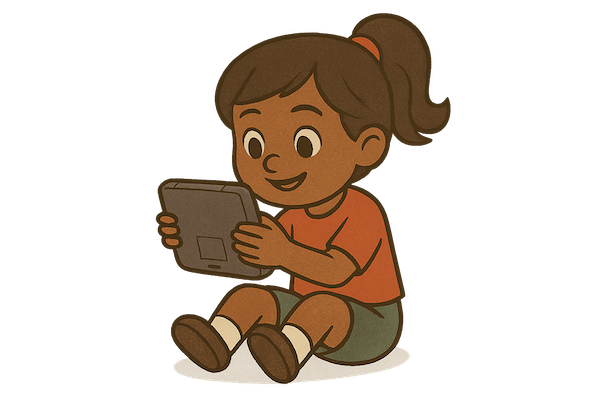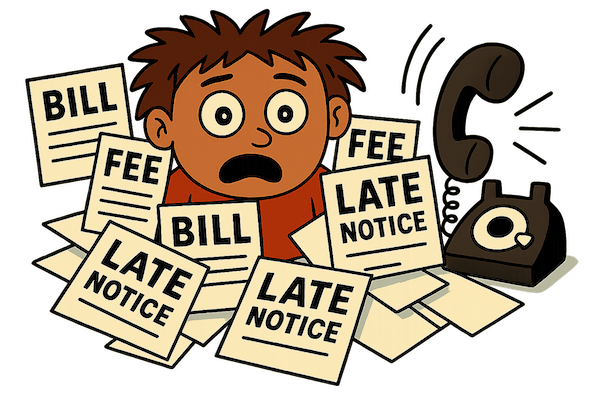Sign In
Credit and Debt JHS







| | 10 Theory slides |
| | 15 Exercises - Grade E - A |
| | Each lesson is meant to take 1-2 classroom sessions |
Catch-Up and Review
Here are a topics that should be understood before getting started with this lesson.
Savings & spending basics:
- What is a personal financial goal?
- How can you make a personal budget?
- What is planned spending vs. necessary spending?
Understanding responsibility and consequences:
- What happens when rules are not followed? (loan repayment fees, penalties, etc.)
Basic percentage and multiplication:
- How will interest increase the total cost of a loan? (e.g., 5 % of $100)
Needs vs. wants:
- Is something worth the cost of paying interest?
- When is borrowing useful or necessary and when is it risky?
What Is a Loan?
A loan is money that you borrow and have to pay back later, usually with extra money added on called interest. When you take out a loan, there are two main parties involved:
- Lender — a person or business (like a bank) that gives the money that is being borrowed
- Borrower — a person that takes a loan and promises to pay it back

Why Do People Take Out Loans?
Sometimes people need money for things that are important but are too expensive to pay for all at once. They might want to buy a car, fix a broken appliance, go to college, or cover any other big expense.
Taking out a loan allows them to get the money they need now and then pay it back, little by little, over time. This way, people can afford big purchases or cover unexpected expenses without having to pay the whole thing right away.Lender or Borrower?
Paying Off a Loan
When you take out a loan, you borrow a certain amount of money which is called the principal of the loan. This is the original amount you borrow, not including anything extra. The most common type of extra money you have to pay is called interest. Interest is like a fee for using someone else's money. Interest is usually a percentage of the principal.

Jalen's New Ride
Jalen wants to buy a used bike for $60.
He doesn't have the money right now, so his older sister says that she will lend it to him but she will also charge him 10 % interest on the loan. He agrees to pay her back in 3 equal payments.
Hint
Solution
$60 + $6 = $66 Jalen will pay back a total of $66 to his sister.
$66/3 = $22 Jalen will pay $22 each time.
$6/3 = $2 For each $22 payment Jalen gives his sister, $2 goes toward the interest.
$22 - $2 = $20 For each $22 payment Jalen gives his sister, $20 goes toward the principal.
The Price of Fun
Ava wants to buy a new video game that costs $30. Her aunt offers to lend her the money but Ava has to pay her back $40 total, in four equal weekly payments.
Hint
Solution
$40 - $30 = $10 Ava is paying $10 in interest.
$10/4=$2.50 Ava will pay her aunt $2.50 each week for four weeks.
Credit Score

How can debt help you build your credit score?
When you borrow money and pay it back on time, you build a good credit score. This shows lenders that you are responsible and can manage your money well. Having a good credit score is like building a good reputation with lenders, which can help you get better loan and credit card deals in the future. Here are some more things that can help or hurt your credit score.
| Actions That Affect Your Credit Score | |
|---|---|
| Help | Hurt |
| Pay bills on time | Miss a payment |
| Keep credit card balances low | Max out credit cards |
| Use credit responsibly | Owe more than you can pay back |
| Keep accounts open for a long time | Frequently open and close credit accounts |
Would It Help, Hurt, or Not Affect Your Credit Score?
Certain actions can boost your credit score, while others can bring it down. Some actions will not change it at all. Look at each situation below and sort it into the most appropriate group.

The Hidden Cost of Forgetting to Pay
When you default on a loan, it means you stopped paying it back like you promised. That might not seem like a big deal now, but it can lead to real problems later!
What Happens When You Default
- You still owe the money — and now maybe even more because of late fees.
- Your credit score drops, making it harder to borrow money again in the future.
- The lender might take back what you bought or send collection agencies after you!
How to Prevent Defaulting
There are many ways that you can prevent yourself from defaulting on a loan.
- Only borrow what you know you can pay back.
- Understand interest before you say yes to a loan. Even low interest can add up if you are not careful!
- Make a budget so you know where your money is going.
- Always communicate with the lender if you are struggling — they might be able to help you out.

The total interest Selena will pay is the difference between the amount she will pay back and the amount she borrowed — the principal.
The total interest Selena will pay is $20.
Your credit score tells lenders if you would be a trustworthy person to loan money to and how likely you are to pay it back on time. Let's consider the given options and think about whether or not the action shows that you are a responsible borrower.
| Option | Would it help or hurt your credit score? |
|---|---|
| A. Missing a payment | Hurts |
| B. Paying on time | Helps |
| C. Not paying back a loan | Hurts |
| D. Borrowing too much | Hurts |
Options A, C, and D all would hurt your credit score.
Who is the lender in this situation?
|
Jacob gives his friend $30 so his friend can buy a backpack. His friend will pay him back in two weeks. |
Let's remember the people who are involved in the loan process.
- Lender: A person or business (like a bank) that gives the money that is being borrowed
- Borrower: A person that takes a loan and promises to pay it back
In this situation, Jacob is giving money to his friend so Jacob is the lender and Jacob's friend is the borrower. The correct answer is A.
Your credit score tells lenders if you would be a trustworthy person to loan money to and how likely you are to pay it back on time. While monitoring your spending and maintaining a budget show responsibility, only borrowing and repayment behavior affect your credit score. Considering these facts, let's match the given actions to their effects on a credit score.
| Action | Effect on credit score |
|---|---|
| Paying late | Lowers score |
| Paying on time | Raises score |
| Defaulting on a loan | Greatly lowers score |
| Checking monthly statements | No effect |
We want to find the amount of interest paid each time so first we need to calculate the total interest paid over the entire time period. Principal - Total paid = Interest paid $150 - $120 = $30 Since the payments are equal and spread over 5 periods, we divide the total interest by the number of payments to find the interest paid each time.
Therefore, the amount of interest paid each time is $6.




